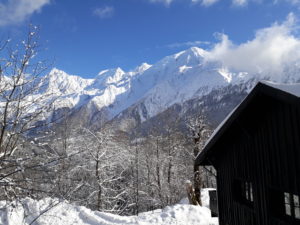2018 News
December 2018
Davide Cadeddu Leaves the Group
Dr. Davide Cadeddu, who earned his Ph.D. in March of this year and has since been working as a post-doc in the group, has accepted a new job starting in 2019. Starting in January, Davide will be working as a Research Associate at Rolic Technologies Ltd., here in the Basel area. Rolic develops and sells applicable coating materials and functional foil products for displays, for security elements and the sealing of highly sensitive products. Rolic’s core competence is light management: with the patent-protected ‘Light Controlled Molecular Orientation’ technology, they modify surfaces on the nanometer-scale to achieve unique optical effects.
Davide has been a key member of our team since May of 2013 and has contributed to many scientific projects including on nanowire mechanics, opto-mechanics, nano-photonics, advanced scanning probe microscopy, and electric field sensing. His excellent experimental intuition and positive presence in the group will be missed. We wish him the best in his new adventure and hope to see him often around town!
Coupling a trapped Ion to a Nanowire
On the 17th, New Journal of Physics published our theoretical study of the coupling between a trapped ultracold ion and a charged nanowire. The manuscript entitled, Classical and quantum dynamics of a trapped ion coupled to a charged nanowire, considers the perturbation of the trapping potential for the ion by the nanowire and discusses the parameters determining the dynamics of the ion under the action of the nanooscillator. We explore the classical dynamics as well as motional quantum states of the ion which can be generated and manipulated with the resonant drive of the nanowire and the effects of anharmonicities of the ion-trap potential on the system. Our modelling indicates that unusual quantum states of the ion motion can be generated with this approach and that sympathetic cooling and quantum entanglement can be realized when both subsystems operate in the quantum regime. This ion-mechanical hybrid system might prove interesting as a new quantum device, for quantum sensing experiments, for spectroscopy and for mass spectrometry.
The work was led and carried out by Ph.D. student Panagiotis Fountas, who is a shared SNI Ph.D. student based in the lab of Prof. Stefan Willitsch in the Chemistry Department. The paper represents the first results of an ongoing collaboration between our group and the Willitsch group and is a prelude to future experimental work in this direction.
Group Dinner
On Friday the 14th the group held its annual end-of-the-year dinner. The dinner was organized by post-docs Davide Cadeddu and Boris Groß at the Restaurant Bodega zum Strauss in down-town Basel. We were joined by current and former group members and friends. Thanks to all for an enjoyable evening!
Prof. Poggio in Aachen
On Monday the 10th Prof. Poggio gave the Physics Colloquium at the Department of Physics at the RWTH Aachen University on the invitation of Prof. Christoph Stampfer.
November 2018
Prof. Poggio at TU Delft
On the 28th and 29th, Prof. Poggio visited TU Delft on the invitation of Prof. Gary Steele. There he participated in the Ph.D. defense of a member of the Steele group, Mr. Shun Yanai on the 28th. On the 29th, he also visited Prof. Katia Pappas and gave a short seminar entitled, “New magnetic scanning probes”, in the group of Prof. Steele.
Marcus Wyss Graduates
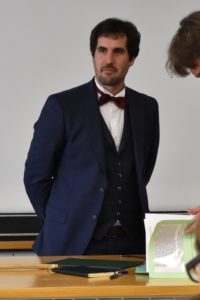 On the 23rd, Ph.D. student Marcus Wyss defended his thesis, entitled ” Nanoscale Magnetic Imaging of ferromagnetic Nanostructures“, earning his doctorate in Physics magna cum laude. The exam was chaired by Prof. Frithjof Nolting with Prof. Poggio and Prof. Dieter Kölle (Tübingen) making up the committee. Marcus joined the lab in April 2014 after doing his Masters project under Prof. Laura Heyderman at the Paul Scherrer Institute (PSI). He pursued a number of nano-magnetic imaging projects including x-ray magnetic circular dichroism photoemission electron microscopy (XMCD-PEEM) experiments at PSI and scanning SQUID microscopy (SSM) experiments in our own lab. Together with former post-doc Dr. Denis Vasyukov, he was the first Ph.D. student to work on fabricating up and using SQUID-on-tip sensors in our lab. He later used both XMCD-PEEM and SSM to study ferromagnetic nanotubes, SSM to study artificial spin ice, and finally worked on a new design for SQUID-on-tip sensors for the next generation of SSM. Fortunately Marcus will not yet be leaving us as he plans to continue pursuing this project in the next year as a post-doc in our group. Congratulations to Dr. Wyss!
On the 23rd, Ph.D. student Marcus Wyss defended his thesis, entitled ” Nanoscale Magnetic Imaging of ferromagnetic Nanostructures“, earning his doctorate in Physics magna cum laude. The exam was chaired by Prof. Frithjof Nolting with Prof. Poggio and Prof. Dieter Kölle (Tübingen) making up the committee. Marcus joined the lab in April 2014 after doing his Masters project under Prof. Laura Heyderman at the Paul Scherrer Institute (PSI). He pursued a number of nano-magnetic imaging projects including x-ray magnetic circular dichroism photoemission electron microscopy (XMCD-PEEM) experiments at PSI and scanning SQUID microscopy (SSM) experiments in our own lab. Together with former post-doc Dr. Denis Vasyukov, he was the first Ph.D. student to work on fabricating up and using SQUID-on-tip sensors in our lab. He later used both XMCD-PEEM and SSM to study ferromagnetic nanotubes, SSM to study artificial spin ice, and finally worked on a new design for SQUID-on-tip sensors for the next generation of SSM. Fortunately Marcus will not yet be leaving us as he plans to continue pursuing this project in the next year as a post-doc in our group. Congratulations to Dr. Wyss!
Nanoskyrmionics Workshop in Basel
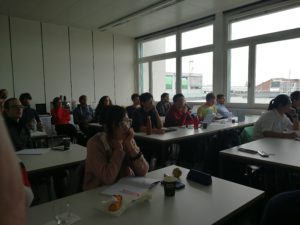 On the 22nd and 23rd, our group held a “Nanoskyrmionics Workshop” for students and post-docs in our Nanoskyrmionics Sinergia Network. The program included talks by researchers in our department (from the Poggio, Maletinsky, and Meyer labs), lab tours, networking events, and two talks by leading experts in nanometer-scale magnetic imaging and sensing. The first was given by Prof. Hans Hug (EMPA) and was entitled, “Thin film systems supporting skyrmion through interfacial DMI. System development based on quantitative MFM”. The second was given by Prof. Dieter Kölle (Tübingen) and was entitled, “NanoSQUIDs for the Investigation of Small Spin Systems”. The workshop was organized by Ph.D. student Simon Philipp, who deserves all the credit for a well-organized, stimulating, and successful event. Thanks Simon!
On the 22nd and 23rd, our group held a “Nanoskyrmionics Workshop” for students and post-docs in our Nanoskyrmionics Sinergia Network. The program included talks by researchers in our department (from the Poggio, Maletinsky, and Meyer labs), lab tours, networking events, and two talks by leading experts in nanometer-scale magnetic imaging and sensing. The first was given by Prof. Hans Hug (EMPA) and was entitled, “Thin film systems supporting skyrmion through interfacial DMI. System development based on quantitative MFM”. The second was given by Prof. Dieter Kölle (Tübingen) and was entitled, “NanoSQUIDs for the Investigation of Small Spin Systems”. The workshop was organized by Ph.D. student Simon Philipp, who deserves all the credit for a well-organized, stimulating, and successful event. Thanks Simon!
October 2018
Katia Pappas Visits
On the 22nd, Prof. Katia Pappas from TU Delft visited our group and gave the a talk at the Nano & and Quantum Seminar entitled, “New magnetic phase of the chiral skyrmion material Cu2OSeO3“. Prof. Pappas held discussions with group members and colleagues, visited our labs, and joined us for dinner.
September 2018
Dmitri Efetov Visits
Prof. Dimitri Efetov from ICFO in Barcelona visited our group on the 24th for discussions with group members and colleagues in the department. In the afternoon he gave a talk at the Nano & and Quantum Seminar.
Introduction to Nanomechanics Begins
Prof. Poggio’s course entitled Introduction to Nanomechanics is now underway. Lectures will be Wednesdays, 10.00-12.00 in Neuer Hörsaal 1. Exercise sessions will be Fridays 12:00-13:00 in Seminarzimmer 3.12.
Annual SNI Meeting in Lenzerheide
From the 13rd to the 14th, Ph.D. student David Jaeger and Prof. Poggio attended the Swiss Nanoscience Institute’s annual meeting in Lenzerheide, Switzerland. David presented a poster entitled, “Experimental setup for qubit cavity optomechanics”.
Marcus and Giulio in Mainz
From the 3rd to the 7th, Ph.D. students Marcus Wyss and Giulio Romagnoli attended the 9th Joint European Magnetic Symposia (JEMS) Conference 2018 in Mainz, Germany. On Wednesday the 5th, Giulio gave a talk entitled, “Nanometer-scale magnetic field imaging with a scanning SQUID-ontip”.On Thursday the 6th, Marcus gave a talk entitled, “Imaging the magnetic stray field of an artificial chiral spin ice system”.
August 2018
Chiral Magnetism School
From the 20th to the 24th, Ph.D. student Simon Philipp and Prof. Poggio attended the Chiral Magnetism Summer school at EPFL, organized by members of the Grundler Group at EPFL through our joint Nanoskyrmionics Sinergia Network. Prof. Poggio gave a talk on Monday entitled, “Dynamic cantilever magnetometry on skrymion-hosting materials” and Simon presented a poster entitled, “Mapping the phase diagrams of the multiferroic lacunar spinels GaV4S8 and GaV4Se8 using dynamic cantilever mangetometry”.
Machine Shop / Poggio Lab BBQ
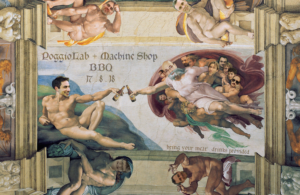 On Friday, the 17th the group enjoyed our annual summer barbeque on the department roof-top with our colleagues from the Machine Shop. Thanks to everyone for a nice time and for helping to organize, set up, and clean up. See you next year!
On Friday, the 17th the group enjoyed our annual summer barbeque on the department roof-top with our colleagues from the Machine Shop. Thanks to everyone for a nice time and for helping to organize, set up, and clean up. See you next year!
July 2018
Prof. Poggio at ICM 2018
The International Conference on Magnetism (ICM) took place in San Francisco, Californa from the 15th to the 20th. Prof. Poggio attended the conference, giving an invited talk on Wednesday morning in the session on Magnetic Configurations and applications of nanowires and nanotubes entitled, “Magnetization configurations and reversal of individual ferromagnetic nanotubes”. He also chaired the associate poster session the same afternoon.
Boris Speaks at Coma-ruga 2018
From the 2nd to the 6th, Dr. Boris Groß attended the 14th International Workshop on Magnetism & Superconductivity at the Nanoscale (Coma-ruga 2018) in Coma-ruga, Spain. Boris gave a talk on the 3rd entitled, “Mapping out Stability Diagrams of Skyrmion Phases using Dynamic Cantilever Magnetometry”. Ph.D. Student Lorenzo Ceccarelli, who also had a speaking slot, was unfortunately unable to attend due to a serious injury. We wish him a rapid and full recovery.
June 2018
Pedram Roushan Visits
Dr. Pedram Roushan from the Google Quantum Hardware Lab in Santa Barbara visited on the 27th. After a tour of our labs, discussions, and visits with colleagues and students, Dr. Roushan gave a special seminar entitled, “Spectral signatures of many-body localization of interacting photons”. The talk focused of his recent work simulating condensed matter systems with superconducting quantum circuits. He also gave us a larger picture of Google’s efforts at building a quantum computer that can solve classically unsolvable problems.
Group BBQ at Birsköpfli
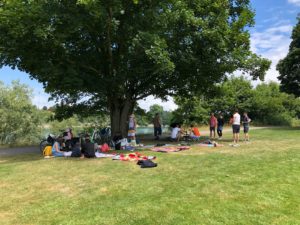 On the 24th, group members, alumni and alumnae, and friends met up for for the 2nd year at the Birsköpfli park along the Rhine river for a barbecue. There was a grill, food, beer, some swimming, bicycles, games, a little whiskey, and good vibes. Pictures and movies are here.
On the 24th, group members, alumni and alumnae, and friends met up for for the 2nd year at the Birsköpfli park along the Rhine river for a barbecue. There was a grill, food, beer, some swimming, bicycles, games, a little whiskey, and good vibes. Pictures and movies are here.
E-MRS in Strasbourg
Prof. Ilaria Zardo (Basel), Prof. Riccardo Rurali (Barcelona), Prof. Ivana Savic (Cork), and Prof. Poggio organized a 3-day symposium at the European Materials Research Society Meeting (E-MRS) in Strasbourg. Symposium N on “Nanostructures for Phononic Applications” took place from the 18th to the 20th and included: theoretical and experimental methods for probing phonons and phonon transport, coherent phonons, thermal circuit elements, thermoelectrics, phononic and phoXonic crystals, and nanomechanics.
Simon Philipp at Sol-SkyMag 2018
Ph.D. student Simon Philipp attended the Sol-SkyMag conference in San Sebastian, Spain from the 18th to the 22nd. Sol-SkyMag is an abbreviation of Solitons and Skyrmion Magnetism. The conference discussed recent progress in the fields of nanomagnetism and spintronics with the aim of bringing together leading reserachers working in these areas. Simon gave a talk on the 19th entitled, “Skyrmion phase stability in FeGe nanowires”. A program for this year’s conference can be found here.
Swiss Nanomechanics Meeting 2018
On the 5th, group members attended the Swiss Nanomechanics Meeting 2018 at ETH Zürich. The workshop brought together Swiss research groups, international guests, and industry partners with a common interest in optomechanics, force sensing, and nonlinear parametric mechanics. The meeting provided a platform to share and discuss recent progress in the field of nanomechanics. Ph.D. student Nicola Rossi from our group gave a talk entitled, “Magnetic force sensing with nanowire mechanical resonators”. Many thanks to Dr. Martin Frimmer, Dr. Alex Eichler, and Dr. Floris Braakman for organizing the workshop. A program can be found here.
May 2018
Paper on Coherent Dynamics in Nanowires Published
In recent years, nanowire (NW) mechanical oscillators have emerged as a platform for force and mass sensing, with favorable properties that include a cantilever geometry, low mass, low mechanical dissipation, and high oscillation frequencies. In a paper published on the 30th by Physical Review Applied entitled, Coherent Two-Mode Dynamics of a Nanowire Force Sensor, we identify strong, highly tunable coupling between a NW’s two orthogonal modes, and use it to drive Rabi oscillations, showing the way to coherent two-mode control techniques for signal enhancement in force and mass sensing. Such techniques could be used to significantly reduce the frequency fluctuations of nanomechanical oscillators, or for innovative forms of noise spectroscopy.
The project was led and carried out by post-doc Dr. Floris Braakman with Ph.D. student Nicola Rossi working on the experiments. Former Ph.D. student Gözde Tütüncüoglu from the group of Prof. Anna Fontcuberta i Morral at EPFL grew the GaAs NWs used in the experiments.
Talk at Monte Verità
On the 28th, Prof. Poggio gave an invited talk at the Quantum Systems and Technology Workshop at the Monte Verità conference center in Ascona, Switzerland. The talk was entitled, “Quantum sensing with a SQUID-on-tip scanning probe”. The workshop covered a number of current topics in quantum science and technology including quantum sensing, quantum simulation, and quantum computation. In particular, several industrial and academinic groups updated the audience on their recent efforts to build 50-qubit quantum computers, with which they plan to achieve “quantum supremacy”, i.e. the demonstration that a quantum computer can be faster than the best classical computer for a certain computation.
Sinergia Meeting at PSI
 On the 24th and 25th, a meeting of our Sinergia network took place at PSI in Villingen, Switzerland organized by Dr. Jonathan White. This network, entitled “Nanoskyrmionics”, is headed by Prof. Dirk Grundler (EPFL) and includes 3 other nodes, each led by a principal investigator: Dr. Jonathan White (PSI), Prof. Oleg Yazyev (EPFL), and Prof. Poggio (Basel). The collaboration aims to do materials discovery and nanoengineering of magnetic skyrmions. Ph.D. student Simon Philipp attended the workshop and the meeting on both days, giving a talk updating his progress to his fellow network members on the 24th. Ph.D student Giulio Romagnoli attended the meeting on the 25th.
On the 24th and 25th, a meeting of our Sinergia network took place at PSI in Villingen, Switzerland organized by Dr. Jonathan White. This network, entitled “Nanoskyrmionics”, is headed by Prof. Dirk Grundler (EPFL) and includes 3 other nodes, each led by a principal investigator: Dr. Jonathan White (PSI), Prof. Oleg Yazyev (EPFL), and Prof. Poggio (Basel). The collaboration aims to do materials discovery and nanoengineering of magnetic skyrmions. Ph.D. student Simon Philipp attended the workshop and the meeting on both days, giving a talk updating his progress to his fellow network members on the 24th. Ph.D student Giulio Romagnoli attended the meeting on the 25th.
Seminar at EPFL
On the 18th, Prof. Poggio visited the Department of Physics at the EPF Lausanne on the invitation of the Head of the Crystal Growth Facility, Dr. Arnaud Magrez. Dr. Magrez is part of our Sinergia network funded by the Swiss National Science Foundation. This collaboration, entitled “Nanoskyrmionics”, is headed by Prof. Dirk Grundler (EPFL) and includes 3 other nodes, each led by a principal investigator: Dr. Jonathan White (PSI), Prof. Oleg Yazyev (EPFL), and Prof. Poggio (Basel). Prof. Poggio gave a talk in the afternoon entitled, “New Scanning Probes for Nanomagnetic Imaging”.
Book on Micro and Nano Scale NMR Published
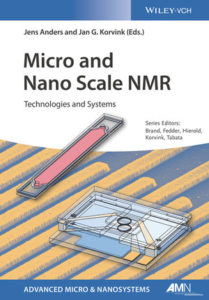 A book covering recent developments in the field of microscale nuclear magnetic resonance hardware and edited by Prof. Jens Anders (Stuttgart) and Prof. Jan Korvink (Karlsruhe) has just been published. Micro and Nano Scale NMR: Technologies and Systems is the first self-contained summary of recent developments in the field of microscale nuclear magnetic resonance hardware, covering the entire technology from miniaturized detectors, the signal processing chain, and detection sequences. Chapters cover the latest advances in interventional NMR and implantable NMR sensors, as well as in using CMOS technology to manufacture miniaturized, highly scalable NMR detectors for NMR microscopy and high-throughput arrays of NMR spectroscopy detectors. Former Ph.D. student Ben Herzog and Prof. Poggio contributed the final chapter, entitled “Force-Detected Nuclear Magnetic Resonance”.
A book covering recent developments in the field of microscale nuclear magnetic resonance hardware and edited by Prof. Jens Anders (Stuttgart) and Prof. Jan Korvink (Karlsruhe) has just been published. Micro and Nano Scale NMR: Technologies and Systems is the first self-contained summary of recent developments in the field of microscale nuclear magnetic resonance hardware, covering the entire technology from miniaturized detectors, the signal processing chain, and detection sequences. Chapters cover the latest advances in interventional NMR and implantable NMR sensors, as well as in using CMOS technology to manufacture miniaturized, highly scalable NMR detectors for NMR microscopy and high-throughput arrays of NMR spectroscopy detectors. Former Ph.D. student Ben Herzog and Prof. Poggio contributed the final chapter, entitled “Force-Detected Nuclear Magnetic Resonance”.
Group Bike Tour
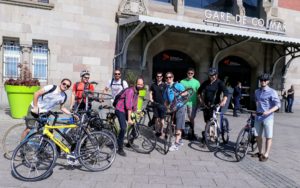 On Friday the 11th, the group went on a day-long bicycle tour of nearby Alsace, France. Starting from Colmar, we cycled through Ingersheim, Turckheim, Husseren-les-Châteaux, and stopped for a delicious lunch in at the Taverne Médiévale in Gueberschwihr. After lunch, we rode to Eguisheim, stopping for a drink and musical interlude before ending the tour back in Colmar. Over the course of what was a beautiful spring day, we discovered that whiskey is great for alleviating allergies, that Giulio cannot miss a rendezvous with an “important package”, and that snails taste really good. Thanks to Nicola Rossi for organizing the tour, to Marcus Wyss for finding and reserving the restaurant, and to all for the good times! Pictures and a movie can be found here.
On Friday the 11th, the group went on a day-long bicycle tour of nearby Alsace, France. Starting from Colmar, we cycled through Ingersheim, Turckheim, Husseren-les-Châteaux, and stopped for a delicious lunch in at the Taverne Médiévale in Gueberschwihr. After lunch, we rode to Eguisheim, stopping for a drink and musical interlude before ending the tour back in Colmar. Over the course of what was a beautiful spring day, we discovered that whiskey is great for alleviating allergies, that Giulio cannot miss a rendezvous with an “important package”, and that snails taste really good. Thanks to Nicola Rossi for organizing the tour, to Marcus Wyss for finding and reserving the restaurant, and to all for the good times! Pictures and a movie can be found here.
Prof. Poggio in Zaragoza
On Monday and Tuesday the 7th and 8th, Prof. Poggio visited the National Laboratory for Advanced Microscopies (LMA) at the University of Zaragoza, Spain on the invitation of Prof. Jose María de Teresa. After tours of the facilities and various discussions regarding our ongoing collaborations, Prof. Poggio gave a seminar on Tuesday entitled, “New Scanning Probes for Nanomagnetic Imaging”.
April 2018
PRB on Magnetization Reversal in Ferromagnetic Nanotubes
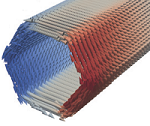 On Thursday the 23rd, Physical Review B published our article entitled, Observation of end-vortex nucleation in individual ferromagnetic nanotubes. The paper discusses experiments in our lab that have uncovered the way in which magnetization reverses in individual ferromagnetic nanotubes (FNTs). Measurements show that reversal starts with the nucleation of magnetic vortex configurations, appearing at the FNT ends. In addition, the results reveal how magnetization reversal can be controlled by changing the FNT geometry.
On Thursday the 23rd, Physical Review B published our article entitled, Observation of end-vortex nucleation in individual ferromagnetic nanotubes. The paper discusses experiments in our lab that have uncovered the way in which magnetization reverses in individual ferromagnetic nanotubes (FNTs). Measurements show that reversal starts with the nucleation of magnetic vortex configurations, appearing at the FNT ends. In addition, the results reveal how magnetization reversal can be controlled by changing the FNT geometry.
To be useful as storage elements in high-density arrays, nanomagnets must reverses in a controllable, fast, and reproducible way. Near edges and surfaces, however, magnetization tends to change direction in order to minimize stray field energy. As a result, surface roughness and imperfections act as nucleation sites for magnetization reversal, resulting in variability of the switching behavior from nanomagnet to nanomagnet. The high surface-to-volume ratio inherent to small structures makes mitigating these effects essential in the design of high-density memories. Although the effect of roughness cannot be completely eliminated, one way to reduce its influence is to use structures that support flux-closure magnetization configurations, which close magnetic flux lines within the magnet. Since these configurations minimize stray field, edges and surfaces play a reduced role in reversal. FNTs support flux closure, in the form of a vortex states, in which magnetization curls around their hollow core.
The study was led by former Ph.D. student Dr. Andrea Mehlin and post-doc Dr. Boris Groß. Ph.D. student Marcus Wyss and former Masters student Thomas Schefer also contributed. The samples were provided by the groups of Prof. Dirk Grundler (EPFL) and Prof. Anna Fontcuberta i Morral (EPFL).
March 2018
Swiss Young Physicists’ Tournament
On the 17th, Prof. Poggio gave a talk entitled, “Nanometer-scale magnetic resonance imaging”, at the Swiss Young Physicists’ Tournament (SYPT), whose 2018 edition was held at the University of Basel. Prof. Poggio introduced the research of our department and focused on our own lab’s efforts at developing techniques for nanometer-scale magnetic resonance imaging. The tournament took place at the Kollegienhaus on Saturday and Sunday the 17th and 18th.
Davide Cadeddu Graduates
On the 13th, Ph.D. student Davide Cadeddu defended his thesis, entitled “Nanomechanics and scanning probe microscopy with nanowires”, earning his doctorate in Physics summa cum laude. The exam was chaired by Prof. Richard Warburton with Prof. Poggio and Prof. Christian Degen (ETHZ) making up the committee. Davide joined the lab in May 2013 through the SNI Ph.D. Program and was the first Ph.D. student in our lab to start working on nanowires (NWs) as scanning probe sensors. After building up a new microscope, which has now become the standard for many of our experiments, Davide started studying nonlinear mechanical effects in NWs with Dr. Floris Braakman. He later collaborated with Dr. Mathieu Munsch (Warburton Group) on several projects involving quantum dots embedded in photonic NWs. This work ultimately led to the realization of a fiber-coupled QD and the proof-of-principle demonstration of scanning electric field microscope based on an optically-addressable QD. Davide’s talent as a scientist, his collaborative spirit, and good nature, will be missed! Congratulations to Dr. Cadeddu and good luck!
Physics II for Physicists Starts
On Thursday the 1st, the lecture “Introduction to Physics II for Physicists: Electrodynamics and Optics” began and will run until Friday, June 1st. The exam is scheduled for June 21st, 2018, 14:00 – 17:00. The lecture covers the basics of electrostatics, magnetostatics, electrodynamics, and optics. Prof. Philipp Treutlein and Prof. Poggio are sharing lecturing responsibilities.
February 2018
Thibaud Ruelle in Ventura
Ph.D. student Thibaud Ruelle traveled to Ventura, California to attend the the Gordon Research Conference (GRC) on “Mechanical Systems in the Quantum Regime” from the 25th to March 2nd. The meeting brought together scientists from the areas precision sensing, metrology, quantum information processing, transduction, and fundamental physics. Participants discussed the most recent experimental and theoretical advances in mechanical systems in the quantum regime. Just as the techniques of quantum optics revolutionized the control and measurement of light, the rise of quantum acoustics now promises novel approaches to measurement science and the study of quantum physics. Thibaud presented a poster on our work coupling nanomechanical elements to a high-finesse optical cavity.
Andrea Mehlin Takes a New Job
Dr. Andrea Mehlin, who earned her Ph.D. in our group in June 2017, and has since been working as a post-doctoral researcher in the group, is starting a new job in mid-March. Andrea will be working in the research division of Innovative Sensor Technology (IST) AG in Ebnat-Kappel, Switzerland. IST AG is a leading manufacturer of physical, chemical, and biological sensors. They specialize in the development and manufacturing of temperature sensors, thermal mass flow sensors, capacitive humidity sensors, conductivity sensors, and biosensors. In addition to development and manufacturing of standard sensors, they also offer consulting and R&D tailored to specific customer requests in the field of sensor technology.
Since her first days in the lab as a Master project student, Andrea has been a crucial member of our group. She will be sorely missed. We wish her the best in her future pursuits!
Group at École de Physique des Houches
From the 11th to the 16th, members of the group attended the joint workshop Spin mechanics-5 and nanoMRI-6 at the École de Physique des Houches in Chamonix, France. The meeting brought together an interdisciplinary community of scientists focusing on a variety of topics including, nanometer-scale magnetic resonance imaging, hybrid spin mechanical systems, spintronics, optomechanics, ultrasensitive force sensing, and magnonics.
Ph.D student Nicola Rossi, post-docs Dr. Boris Groß and Dr. Floris Braakman, and Prof. Poggio attended the week-long meeting and made presentations. Nicola presented a poster entitled, “Magnetic sensing with a self-assembled nanowire”, Floris a poster entitled, “Coherent force microscopy using a nanowire mechanical resonator”, and Boris a poster entitled, “Néel-type skyrmions in multiferroic lacunar spinels – mapping out a stability phase diagram using dynamic cantilever magnetometry”. Prof. Poggio gave an invited talk entitled, “Nanomechanics and nanomagnetism” summarizing our group’s recent work.
Annual QSIT Meeting in Arosa
From the 5th to the 9th, members of the group attended the 7th NCCR QSIT Winter School & 8th NCCR QSIT General Meeting in Arosa, Switzerland. Ph.D students Simon Philipp, Giulio Romagnoli, and David Jaeger attended both the school and the meeting, while Ph.D. student Lorenzo Ceccarelli, post-doc Dr. Floris Braakman, and Prof. Poggio attended the meeting. Simon, David, and Floris presented posters on their work and Prof. Poggio gave a talk on the 9th entitled, “Scanning probe microscopy with Quantum Sensors”. A special thanks to Ilona Blatter for organizing an excellent meeting.
Group members at ‘Advances in Magnetics’
From the 4th to the 7th, Ph.D. student Marcus Wyss and post-doc Dr. Boris Groß attended the Advances in Magnetics (AIM) conference organized by the IEEE in La Thuile, Italy. Marcus gave a talk on the 6th entitled, “Imaging the magnetic stray field of an artificial chiral spin ice system” and Boris gave a talk on the 7th entitled, “Néel-type skyrmions in multiferroic lacunar spinels – Mapping out a stability phase diagram using dynamic cantilever magnetometry”.
January 2018
Farewell Dinner
On Friday the 19th, the group held a farewell dinner for post-doc Dr. Denis Vasyukov, who will be starting a job at the Federal Institute of Metrology (METAS) in Bern in February. Denis joined the lab in February 2014, initially to work on nanowire sensors. He has since taken the lead on our scanning nano-SQUID project, establishing the fabrication and use of SQUID-on-tip sensors in our group. At the dinner, we also celebrated the first publication to come out of this project: Imaging stray magnetic field of individual ferromagnetic nanotubes. We wish Denis the best of luck in Bern and look forward to continuing to work with him on the various projects that he started here in Basel.
XXII Swiss NMR Symposium
The Swiss NMR Symposium, a biennial one-day symposium that brings together researchers from all fields of magnetic resonance in Switzerland, was held at ETH Zürich on the 16th. Prof. Poggio gave a talk entitled, “Nanomagnetic Sensing and NMR”, in the afternoon session on “Solid-state NMR and MRFM”. The program can be found here.
Two New Students Start
This month two new Ph.D. students joined our group. David Jaeger, who started with us as an intern in October 2017, officially began working as a Ph.D student on the 1st. David received his Bachelor of Science in Physics in 2014 and his Masters degree in Physics in 2017, both from the University of Basel. He did his Masters thesis in the Maletinsky group here in Basel. For his thesis he will start working on our opto-mechanics projects. Hinrich Mattiat started work as a Ph.D. student on the 15th. Hinrich received his Bachelor of Science in Interdisciplinary Sciences (Chemistry and Physics) in 2015 and his Masters degree in Interdisciplinary Sciences (Physics and Physical Chemistry) in 2017, both from the ETH Zürich. He did his Masters thesis in the Degen group at ETH Zürich. Here in Basel, he will begin working on our nanowire sensing experiments.
Scanning SQUID Paper Published
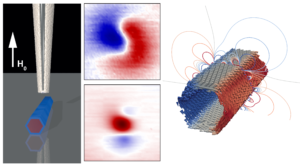 On the 2nd, our first paper on scanning nanometer-scale superconducting quantum interference device (SQUID) microscopy was published by Nano Letters as a “Just Accepted Manuscript”. This technique, originally developed by the Zeldov group at the Weizmann Institute, allows for ultrasenitive magnetic and thermal imaging. In our latest paper, entitled, Imaging stray magnetic field of individual ferromagnetic nanotubes, we use a SQUID-on-tip (SOT) sensor to map the stray magnetic field produced by individual ferromagnetic nanotubes (FNTs) as a function of applied magnetic field. The images are taken as each FNT is led through magnetic reversal and are compared with micromagnetic simulations, which correspond to specific magnetization configurations. In magnetic fields applied perpendicular to the FNT long axis, their magnetization appears to reverse through vortex states, i.e. configurations with vortex end domains or – in the case of a sufficiently short FNT – with a single global vortex. Geometrical imperfections in the samples and the resulting distortion of idealized magnetization configurations influence the measured stray-field patterns.
On the 2nd, our first paper on scanning nanometer-scale superconducting quantum interference device (SQUID) microscopy was published by Nano Letters as a “Just Accepted Manuscript”. This technique, originally developed by the Zeldov group at the Weizmann Institute, allows for ultrasenitive magnetic and thermal imaging. In our latest paper, entitled, Imaging stray magnetic field of individual ferromagnetic nanotubes, we use a SQUID-on-tip (SOT) sensor to map the stray magnetic field produced by individual ferromagnetic nanotubes (FNTs) as a function of applied magnetic field. The images are taken as each FNT is led through magnetic reversal and are compared with micromagnetic simulations, which correspond to specific magnetization configurations. In magnetic fields applied perpendicular to the FNT long axis, their magnetization appears to reverse through vortex states, i.e. configurations with vortex end domains or – in the case of a sufficiently short FNT – with a single global vortex. Geometrical imperfections in the samples and the resulting distortion of idealized magnetization configurations influence the measured stray-field patterns.
The research was led by post-doc Dr. Denis Vasyukov and Ph.D. student Lorenzo Ceccarelli. Ph.D. students Marcus Wyss, Andrea Mehlin, and Nicola Rossi, and former Masters student Alexander Schwarb all worked on the project. Post-doc Dr. Boris Groß made crucial contributions in developing and running the nanomagnetic simulations required for the study. The samples were provided by the groups of Prof. Dirk Grundler (EPFL) and Prof. Anna Fontcuberta i Morral (EPFL). Important characterization measurements were done by Dr. András Kovacs (Jülich) and Dr. Reza Zamani (Lund).

